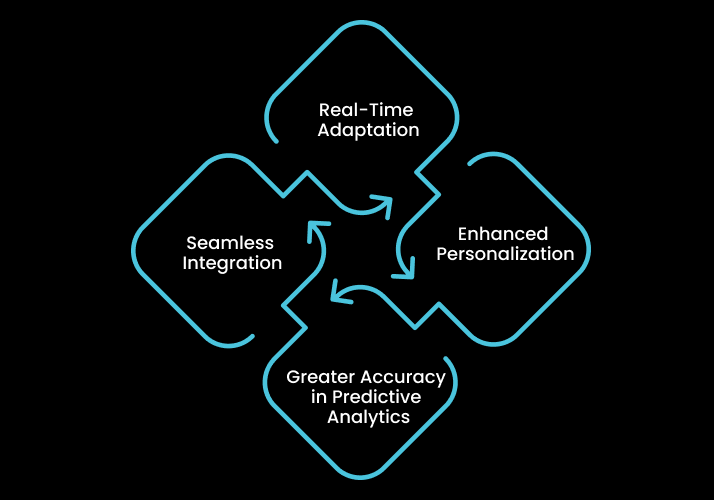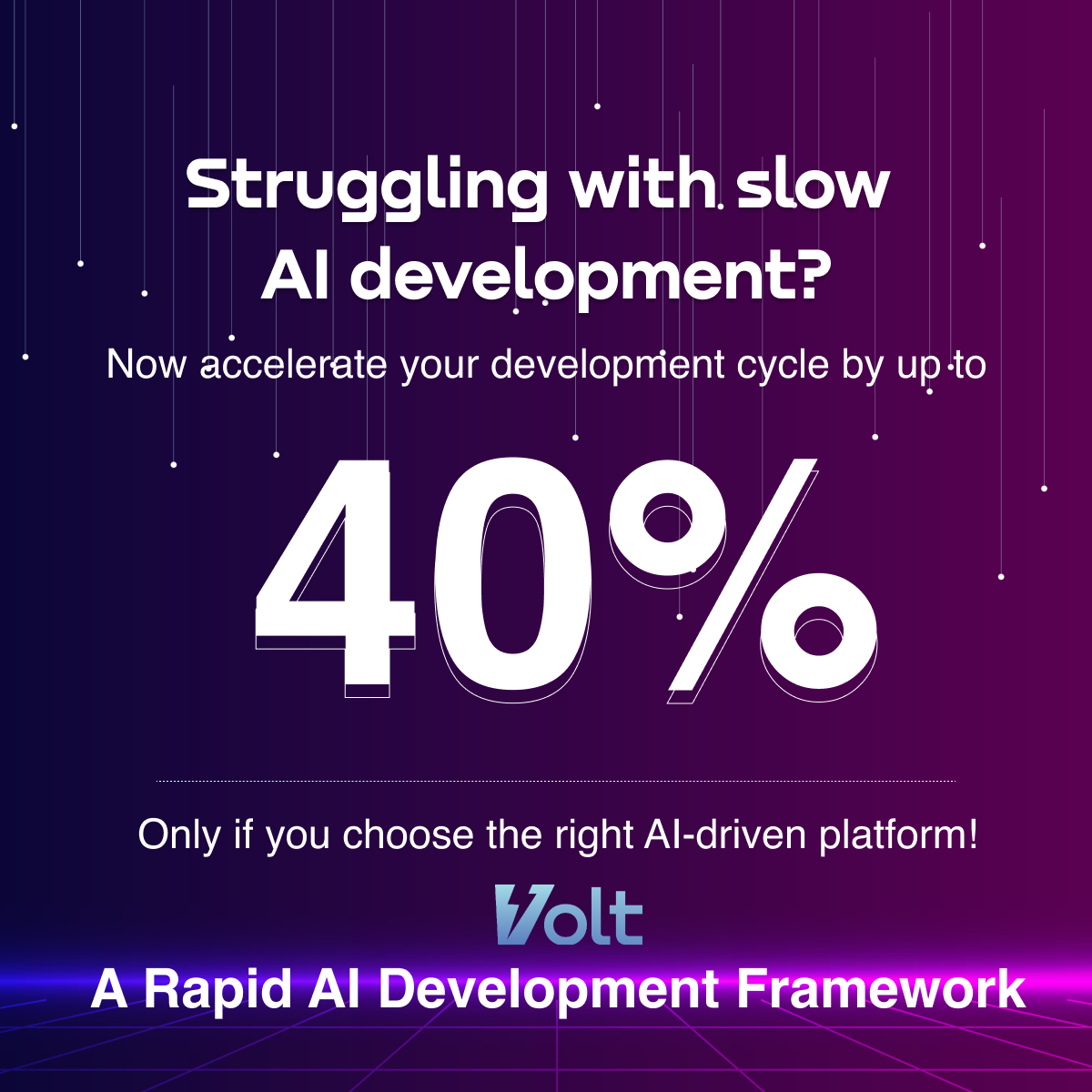AI Agents and Adaptive AI
AI Agents and Adaptive AI: Their Role in the Development of Future Intelligent Automation
 Updated 19 Nov 2024
Updated 19 Nov 2024

Artificial Intelligence (AI) is becoming the main driver of change in how organisations work, introducing enhanced potentialities for performance, analysis and automated processes. Two exciting trends are AI agents and adaptive AI, the concepts that are reshaping the essence of intelligent automation. With current trends focusing on minimizing costs and improving efficiency, AI, and adaptive AI are valuable propositions that can self-develop, self-learn, and continuously self-optimize processes.
The predictions for the market size of the automation industry with AI are showing at $15 billion by 2025 based on the discoveries made with AI agents and adaptive AI. It is enabling corporations to manage a change-oriented world and make business processes more efficient and more relevant for the client. With the support of an AI agent development company, businesses can leverage these advanced AI-driven solutions to streamline operations and enhance decision-making. Read on to understand more about what AI agents and Adaptive AI are, how they operate, where they have been applied, and why both are key to the future of Intelligent Automation.
AI Agents
AI agents are sophisticated independent software tools capable of acting based on instructions provided to them by a user or another program. These are self-served agents that employ machine learning and natural language processing to analyse instructions as well as generate, process and provide corresponding data. The level of AI agents can be as simple as a chatbot used in customer relations or as complex as decision-making agents capable of performing multiple steps within a logical system like data analysis, workflow automation, and decision-making.
Key Characteristics of AI Agents
- Autonomy: By getting AI agents fully functional, people do not have to control them all the time.
- Learning Capabilities: They get better with practice because as they compile more data they develop better patterns for analysis.
- Task Specialization: Usually, designing and developing AI results in the creation of AI agents that have one or multiple aims and goals, for example performing a given set of operations answering questions, resolving customer queries, or managing the same or different processes in organizations.
Read Our Case Study: Transforming Content Management with a Gen AI-Powered CMS and Publishing System for a TV Home Shopping and Retail Platform
Adaptive AI
Adaptive AI may be defined as a specific category within artificial intelligence that is characterized by its ability to adapt and learn expertly. In contrast to the paradigm of AI models that are designed to be trained and used in production afterwards, adaptive AI systems are intended to change their actions based on outcomes observed with the data or changes in context. This practical versatility helps the systems to respond to unexpected occurrences while improving their efficiency in response to the industry’s changing conditions.
Key Characteristics of Adaptive AI
- Real-time Learning: Adaptive AI systems grow as they function with each interaction and their behaviour and reaction are optimally modified.
- Environmental Sensitivity: As such, controllable factors change depending on the context, and thereby respond to variability in user activities, or the environment at large.
- Personalization: Adaptive AI learns from the data of each user, and as such, is exceptionally useful for fields such as customer service and sales promotion.
Learn how artificial intelligence technology is a flexible solution for your business processes. Q3 Technologies has very sophisticated AI solutions; you can give us a call today to secure ours.
How are AI agents, and adaptive AI contributing to intelligent automation?
The integration between two forms of AI namely intelligent agents and adaptive AI is gradually causing a revolution in how organisations implement automation. They are not just transitioning from simple automation to smart automation where the system knows what to do, how to do it, and is capable of learning from experience. Thus, the use of AI agents with adaptive AI capabilities allows for progress in the result rates of organizational operations’ effectiveness, reliability, and scale.
Advantages of using AI Agents and Adaptive AI as Automation Tools
- Increased Efficiency: AI agents help organizations execute monotonous tasks; this redirects time-consuming duties for employee productivity, which results in high productivity.
- Enhanced Decision-Making: Adaptive AI can work through large sets of information and find relationships, coming to conclusions with real-time data to increase effectiveness.
- Scalability: AI agents can easily accommodate increasing loads of work that result in the ability of businesses to expand while incurring the costs of hiring more employees.
- Personalization: Adaptive AI systems can thus adapt to how the user prefers to be served to improve their satisfaction levels and as such gain their loyalty.
- Proactive Problem-Solving: These AI tools can learn and even prevent problems from happening by taking early and necessary action.
Applications of AI Agents & Adaptive AI in Different Industries
1. Customer Service and Support
AI agents are popular in customer relations and involve creating avatars that respond to customers’ questions, perform certain actions at the client’s request, or address customer complaints. However, when combined with adaptive AI, these agents can perceive and appreciate users’ evolving needs, give out personalized results/more suitable solutions, or provide anticipated customer needs based on databases/previous experiences.
Example Use Case:
An interactive customer care AI that can independently answer customer questions, suggest related products and services, and remember the customer information, to expeditiously meet their needs in subsequent responses.
2. Healthcare
The two classes of AI, namely the adaptive AI and the AI agents are currently posing impressive advancements in the healthcare field. Current applications of AI involve alerting the doctors on patient readiness, patient health status, and the records of the patients. In contrast, adaptive AI can forecast patient outcomes, recommend treatments to improve their health and interpret big sets of medical information that can help doctors make choices.
Example Use Case:
AI assistants that alert patients to take medication, keep track of symptoms and reconsider treatments depending on the data in the process.
If you are just ready to get down and start making changes to your customer service or your healthcare organization using Artificial Intelligence then you are just in the right place. Discover more about it in Q3 Technologies’ AI development services.
3. Finance
AI agents are proving their importance in fields of finance and banking particularly in issues of detecting fraudulence, customer-contracting, and financial advising. Adaptive AI can identify structural patterns of transactions and possible irregularities and inform relevant banks and financial institutions about those irregularities to combat fraud and safeguard the customers’ information.
Example Use Case:
An artificially intelligent financial consultant for users and investors whom the program can learn user’s preferences and market trends, and then come up with the best investment decision for the client.
4. Retail and E-commerce
The e-commerce industry applies it for sourcing, recommendation systems and filters, inventory optimization, and customer service through AI agents and adaptive AI. Making product recommendations adaptive to user interactions, time, and other variables permanently, will enable retailers to sell many products and make their customers happy.
Example Use Case:
An online help tool, which presents to customers the items that might interest them considering their previous activity, latest purchases, and offers.
5. Manufacturing and Supply Chain Management
In manufacturing, the AI agents perform tasks such as inventory, quality assurance and equipment tracking. Semi-autonomous AI can be used to forecast demand patterns to help in supply chain management and to achieve Just in Time Inventory Replenishment to provide maximum cost benefit.
Example Use Case:
AI agents in a manufacturing scenario involve keeping an eye on the performances of the machinery, identifying their ability to fail and recommending timekeepers based on the utilizing data.
Read Our Case Study: Optimizing E-commerce Application with AI-Driven Digital Transformation for a TV Home Shopping and Retail Platform
The Future of AI Agents and Adaptive AI in Intelligent Automation
Given the current future trends and advancements in artificial intelligence technology, both AI agents and adaptive AI will play additional growth-related roles within firms. These technologies are expected to stand as normal practice in almost all industries by 2025 where they are used for decision-making as well as to support fully autonomous work. Here are some trends we can anticipate:

- Real-Time Adaptation: Advanced AI systems will integrate the capability of improving their flexibility of operation in responding to shifts in user trends or other factors.
- Enhanced Personalization: AI agents shall become more specialized, thus improving customer interaction personalization to the extreme.
- Greater Accuracy in Predictive Analytics: Adaptive AI will help improve the effectiveness of predictive analytics hence the decisions made will be accurate.
- Seamless Integration: AI agents will also interact with various enterprise systems creating a flow of data between departments.
AI agents, for example, can help develop and implement adaptive AI not only to improve efficiency but also to strengthen a company with a business model that is reactive and strong regardless of the changes it faces. AI Automation brings great promise for the future of organisations willing to embrace the potential capability of its integration.
Why Q3 Technologies for AI Solutions?
Q3 Technologies brings an experience of more than two decades in AI-driven solutions and offer bespoke AI agents and adaptive AI solutions indispensable for any organization. Q3 Technologies is your one-stop solution as you transform your business through intelligent automation – consultation, assessment, and integration.
Our team of experienced AI developers works with you to create tailored AI solutions that help you achieve your goals enhance customer satisfaction, operate more efficiently, integrate intelligent systems, and more.
Go to the next level in automating your processes and systems. Get in touch with us today to learn more about our AI expertise.
Conclusion
AI agents and adaptive AI are one of the biggest advancements in intelligent automation empowering companies to become smarter and make more informed decisions. Together with automation of different assignments, these technologies could be described as flexible and personalized as they can learn to perform in conditions that differ from those established during training. In customer relations, health care, banking, and production processes, adaptive AI and AI agents are extremely valuable.
As organizations consolidate their strategies for the future, remaining agile and ready to automate using Artificial Intelligence becomes compulsory. Those companies that will implement these technologies will stand to benefit from better market adaptability, growth, and delivery of customer value propositions.
If you have been waiting for ways to introduce AI Agents and adaptive AI into your organization, then welcome to Q3 Technologies. If you are unsure how to adapt your business strategy to AI or whether emerging technologies still apply to you, we are here to guide you with our experience in AI advancements.
Table of content
- AI Agents
- Adaptive AI
- How are AI agents, and adaptive AI contributing to intelligent automation?
- Advantages of using AI Agents and Adaptive AI as Automation Tools
- Applications of AI Agents & Adaptive AI in Different Industries
- The Future of AI Agents and Adaptive AI in Intelligent Automation
- Why Q3 Technologies for AI Solutions?

Explore More

Volt: A Rapid AI Development Framework
Introducing Volt: Q3's Rapid AI Development Framework

Artificial Intelligence
